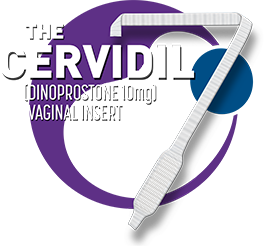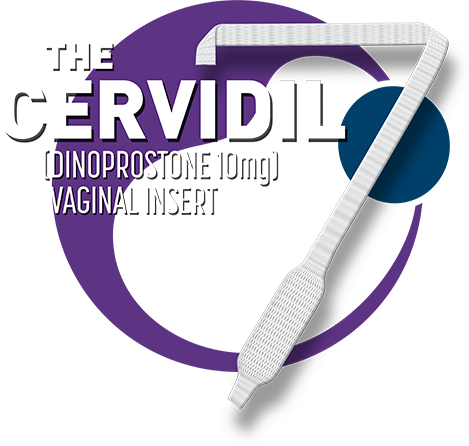Intended for U.S. Healthcare Professionals
Expecting Moms
Your answer is incorrect!
No. According to the label, the vaginal insert must not be used without its retrieval system. Do not wrap the long tape around the insert slab or cut off the long tape. A minimal amount of water-miscible lubricant may be used to assist insertion of CERVIDIL. Care should be taken not to permit excess contact or coating with the lubricant, which could prevent optimal swelling and release of dinoprostone from the vaginal insert.1 See how to properly administer and dose CERVIDIL in our administration video.
Find out your CERVIDIL 7 score!
Answer remaining questions >see everything you need to know about CERVIDIL in 1 click
Almost there!
Sign up to see your CERVIDIL 7 Score
(or skip this step)
Be the first to get news, information, videos, and data about CERVIDIL.
Congratulations!
You answered s correctly
correctly
You're a CERVIDIL champion!
Try again to see if you can get all of the CERVIDIL 7
| QUESTION | YOUR ANSWER |
| 1
What is the half-life of dinoprostone, the active ingredient in
CERVIDIL?
|
Between 2.5 and 5 minutes
Correct. The half-life of dinoprostone is estimated to be 2.5 to 5 minutes. As with any local hormone, dinoprostone is very rapidly metabolized in the tissues of synthesis.1 See other safety information. Incorrect. The half-life of dinoprostone is estimated to be 2.5 to 5 minutes. As with any local hormone, dinoprostone is very rapidly metabolized in the tissues of synthesis.1 See other safety information. |
| 2
CERVIDIL releases dinoprostone at a controlled rate of ___ mg/hr
for up to a period of ___ hours.
|
0.3mg/hr : 12 hours
Right! CERVIDIL uses a controlled release of dinoprostone of 0.3 mg/hr over 12 hours.1 Watch the drug delivery chapter of the administration video. Sorry! The controlled release of dinoprostone occurs at a rate of 0.3 mg/hr over 12 hours.1 Watch the drug delivery chapter of the administration video. |
| 3
What type of prostaglandin is CERVIDIL?
|
PGE2
Correct. Dinoprostone (PGE2) is a naturally occurring biomolecule. It is found in low concentrations in most tissues of the body and functions as a local hormone. As with any local hormone, it is very rapidly metabolized in the tissues of synthesis (the half-life is estimated to be 2.5 to 5 minutes).1 CERVIDIL is the synthetic version of the naturally occurring PGE2.1 Download full Prescribing Information to see additional details.
Incorrect. Dinoprostone (PGE2) is a naturally occurring biomolecule. It is found in low concentrations in most tissues of the body and functions as a local hormone. As with any local hormone, it is very rapidly metabolized in the tissues of synthesis (the half-life is estimated to be 2.5 to 5 minutes).1 CERVIDIL is the synthetic version of the naturally occurring PGE2.1 Download full Prescribing Information to see additional details.
|
| 4
What percentage of neonates whose mothers received CERVIDIL had a
5-minute Apgar score of 7 or above?
|
98%
Correct! Five-minute Apgar scores were 7 or above in 98.2% (646/658) of studied neonates whose mothers received CERVIDIL.1 See additional information and study design on the safety page. Sorry! Five-minute Apgar scores were 7 or above in 98.2% (646/658) of studied neonates whose mothers received CERVIDIL.1 See additional information and study design on the safety page. |
| 5
CERVIDIL is indicated for patients already receiving oxytocic
drugs, with previous cesarean section, or with unexplained vaginal bleeding.
|
False
Right! CERVIDIL is contraindicated in:
Please see full Important Safety Information. Incorrect. CERVIDIL is contraindicated in:
Please see full Important Safety Information. |
| 6
During clinical trials, what percentage of patients experienced
drug-related fever, nausea, vomiting, diarrhea, or abdominal pain?
|
<1%
Right! In clinical trials, drug-related fever, nausea, vomiting, diarrhea, and abdominal pain were noted in less than 1% of patients who received CERVIDIL.1 See additional information and study design on the safety page. Sorry! In clinical trials, drug-related fever, nausea, vomiting, diarrhea, and abdominal pain were noted in less than 1% of patients who received CERVIDIL.1 See additional information and study design on the safety page. |
| 7
When administering CERVIDIL, it is inappropriate to wrap the long
retrieval tape around the insert.
|
True
That’s right! The vaginal insert must not be used without its retrieval system. Do not wrap the long tape around the insert slab or cut off the long tape. A small amount of water-soluble lubrication may be used when administering CERVIDIL, but do not use so much that it prevents the dinoprostone from reaching the cervix.1 See CERVIDIL in action in our administration video.
No. According to the label, the vaginal insert must not be used without its retrieval system. Do not wrap the long tape around the insert slab or cut off the long tape. A minimal amount of water-miscible lubricant may be used to assist insertion of CERVIDIL. Care should be taken not to permit excess contact or coating with the lubricant, which could prevent optimal swelling and release of dinoprostone from the vaginal insert.1 See how to properly administer and dose CERVIDIL in our administration video.
|
| QUESTION | 1
What is the half-life of dinoprostone, the active ingredient in
CERVIDIL?
|
| YOUR ANSWER |
Between 2.5 and 5 minutes
Correct. The half-life of dinoprostone is estimated to be 2.5 to 5 minutes. As with any local hormone, dinoprostone is very rapidly metabolized in the tissues of synthesis.1 See other safety information. Incorrect. The half-life of dinoprostone is estimated to be 2.5 to 5 minutes. As with any local hormone, dinoprostone is very rapidly metabolized in the tissues of synthesis.1 See other safety information. |
| QUESTION | 2
CERVIDIL releases dinoprostone at a controlled rate of ___ mg/hr
for up to a period of ___ hours.
|
| YOUR ANSWER |
0.3mg/hr : 12 hours
Right! CERVIDIL uses a controlled release of dinoprostone of 0.3 mg/hr over 12 hours.1 Watch the drug delivery chapter of the administration video. Sorry! The controlled release of dinoprostone occurs at a rate of 0.3 mg/hr over 12 hours.1 Watch the drug delivery chapter of the administration video. |
| QUESTION | 3
What type of prostaglandin is CERVIDIL?
|
| YOUR ANSWER |
PGE2
Correct. Dinoprostone (PGE2) is a naturally occurring biomolecule. It is found in low concentrations in most tissues of the body and functions as a local hormone. As with any local hormone, it is very rapidly metabolized in the tissues of synthesis (the half-life is estimated to be 2.5 to 5 minutes).1 CERVIDIL is the synthetic version of the naturally occurring PGE2.1 Download full Prescribing Information to see additional details.
Incorrect. Dinoprostone (PGE2) is a naturally occurring biomolecule. It is found in low concentrations in most tissues of the body and functions as a local hormone. As with any local hormone, it is very rapidly metabolized in the tissues of synthesis (the half-life is estimated to be 2.5 to 5 minutes).1 CERVIDIL is the synthetic version of the naturally occurring PGE2.1 Download full Prescribing Information to see additional details.
|
| QUESTION | 4
What percentage of neonates whose mothers received CERVIDIL had a
5-minute Apgar score of 7 or above?
|
| YOUR ANSWER |
98%
Correct! Five-minute Apgar scores were 7 or above in 98.2% (646/658) of studied neonates whose mothers received CERVIDIL.1 See additional information and study design on the safety page. Sorry! Five-minute Apgar scores were 7 or above in 98.2% (646/658) of studied neonates whose mothers received CERVIDIL.1 See additional information and study design on the safety page. |
| QUESTION | 5
CERVIDIL is indicated for patients already receiving oxytocic
drugs, with previous cesarean section, or with unexplained vaginal bleeding.
|
| YOUR ANSWER |
False
Right! CERVIDIL is contraindicated in:
Please see full Important Safety Information. Incorrect. CERVIDIL is contraindicated in:
Please see full Important Safety Information. |
| QUESTION | 6
During clinical trials, what percentage of patients experienced
drug-related fever, nausea, vomiting, diarrhea, or abdominal pain?
|
| YOUR ANSWER |
<1%
Right! In clinical trials, drug-related fever, nausea, vomiting, diarrhea, and abdominal pain were noted in less than 1% of patients who received CERVIDIL.1 See additional information and study design on the safety page. Sorry! In clinical trials, drug-related fever, nausea, vomiting, diarrhea, and abdominal pain were noted in less than 1% of patients who received CERVIDIL.1 See additional information and study design on the safety page. |
| QUESTION | 7
When administering CERVIDIL, it is inappropriate to wrap the long
retrieval tape around the insert.
|
| YOUR ANSWER |
True
That’s right! The vaginal insert must not be used without its retrieval system. Do not wrap the long tape around the insert slab or cut off the long tape. A small amount of water-soluble lubrication may be used when administering CERVIDIL, but do not use so much that it prevents the dinoprostone from reaching the cervix.1 See CERVIDIL in action in our administration video.
No. According to the label, the vaginal insert must not be used without its retrieval system. Do not wrap the long tape around the insert slab or cut off the long tape. A minimal amount of water-miscible lubricant may be used to assist insertion of CERVIDIL. Care should be taken not to permit excess contact or coating with the lubricant, which could prevent optimal swelling and release of dinoprostone from the vaginal insert.1 See how to properly administer and dose CERVIDIL in our administration video.
|

